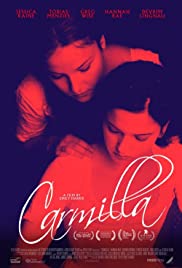
CARMILLA
UK, 2019, 94 minutes, Colour.
Hannah Rae, Devrim Lingnau, Jessica Raine, Tobias Menzies, Scott Silven, Lorna Gayle, Greg Wise.
Directed by Emily Harris.
From the title, audiences in the know would be expecting a vampire story, a focus on women and relationships and vampire consequences. Audiences will be thinking of the novel by Irish writer, Sheridan Le Fanu, a strong reputation during the 19th century, and an influence on fellow countryman, Bram Stoker, for his 1897 vampire classic, Dracula. (An interesting cultural question as to why key English language vampire novels emerge from 19th-century Ireland!.)
Someone trying to categorise this particular version of the novel, Carmilla, has come up with the tag description “romantic horror”.
In fact, there is very little real horror in the expected sense during this film. The emphasis is definitely on the romantic. The setting is a wealthy mansion in the English countryside, a countryside with woods, a lake, surrounding mountains. A lot of the action takes place in the grounds, beyond, and in the interiors of the mansion. Plenty of attention to costumes and decor. And an appropriate classic style musical score. It is the setting for a Gothic tale.
At the centre of the story is a teenage girl (although this sounds too modern a description of this young lady of the upper-class). Her name is Lara (Hannah Rae). She lives with her father and has a governess, Miss Fontaine. Her father, Mr Bauer is played by Greg Wise. Miss Fontaine, a telling performance from Jessica Raine, one of those ambiguous 19th-century characters, romantic but with a touch of Mrs Danvers as well, strict supervision of Lara, every detail, manners, prayers, meals, etiquette – and, well, Lara left-handed and having her arm tied behind her back for so many activities so that she will become properly right-handed. Lara is pining for some company and a young lady from town, Charlotte, is due to arrive.
Instead… A carriage is overturned on the country road nearby, and another young teenager (young lady) is rescued, recuperates at the house. Her background is something of a mystery. Her name is Carmilla (Devrim Lingnau). In the original, there is a strong lesbian falling in love, more explicit vampire conventions. They are not employed here, the conventions, except that the two girls bond eternal friendship by blood. Rather, the relationship and its sinister consequences are suggested by atmosphere, health complications, loneliness and languishing.
Audiences who were expecting more realistic interpretation of the classic expressed disappointment and frustration. Audiences who are satisfied with differing interpretations, drama by suggestion and intimation rather than the obvious may find this version interesting as well as tantalising.
- The description of the film as romantic horror? More romance than horror?
- The original novel by Sheridan Le Fanu? A less vampiric interpretation?
- The English setting, the touch of the Gothic story, the 19th century, the countryside and the woods, the lake, the mansion, the interiors? Costumes and decor, period? The musical score?
- The focus on Lara, her age, her relationship with her father, young, isolated, ladylike? Under the care of Miss Fontaine? Her daily routine, control, meals, study, walks? The significance of Lara being left-handed, writing, meals? Her hand tied behind her back? Miss Fontaine’s strict interpretation and control?
- Lara and her father, his concern? The doctor and his visits? The other members of the staff?
- Lara, looking forward to the visit from Charlotte, her loneliness, wanting to share, letting her imagination go? The news that Charlotte was not coming? Miss Fontaine and her control?
- The accident in the forest, the overturned coach, the deaths, the rescue of Carmilla? Bringing her to the house, the care of the doctor, gradual recovery?
- Carmilla, gradually recovering, her friendship with Lara, developing, the beginnings of infatuation, the deeper relationship? The two girls together, talking, sharing, common interests, hobbies? Walks? Becoming blood sisters, sharing the blood?
- The fair, the visit of the magician, his tricks?
- Miss Fontaine, governess, repressed, control? Her relationship and passion? The discovery of the book, the cult overtones and suggestions?
- Mr Bower, going to search for Charlotte, absence, return?
- The buildup to the drama, Lara and her illness, Camille and her influence – at her death, reminiscent of the vampire death?
- A contemporary to film? Atmospheric? Not explicitly vampiric? Finding suggestion, physical illness, mental conditions, emotional conditions as the vampiric equivalent?